More fun with Facebook: THE
« previous post | next post »
The script that I used to make that course assignment about Facebook pronouns ("Sex, age, and pronouns on Facebook", 9/19/2014; "More fun with Facebook pronouns", 9/27/2014) can trivially be focused on any other words — so here's "the":
And "this":
Also "those":
And "that" (though the determiner version is mixed with the complementizer):
And "which":
For some reason, "these" doesn't show an age effect:
We may get a clue about what's going on from "and":
And also "or":
But "but":
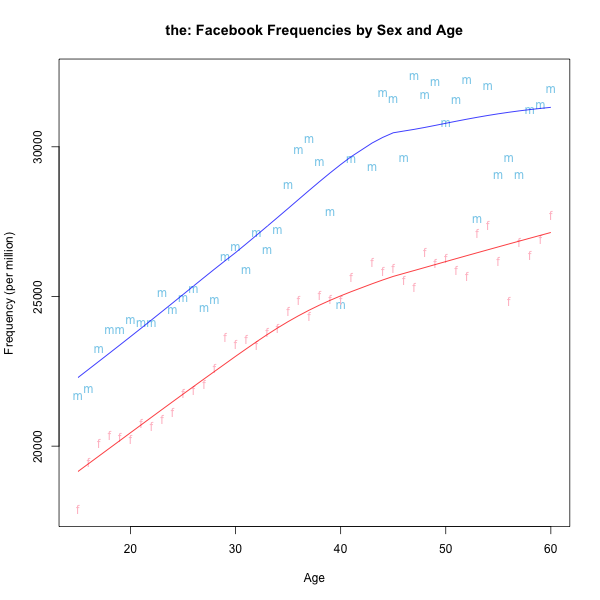

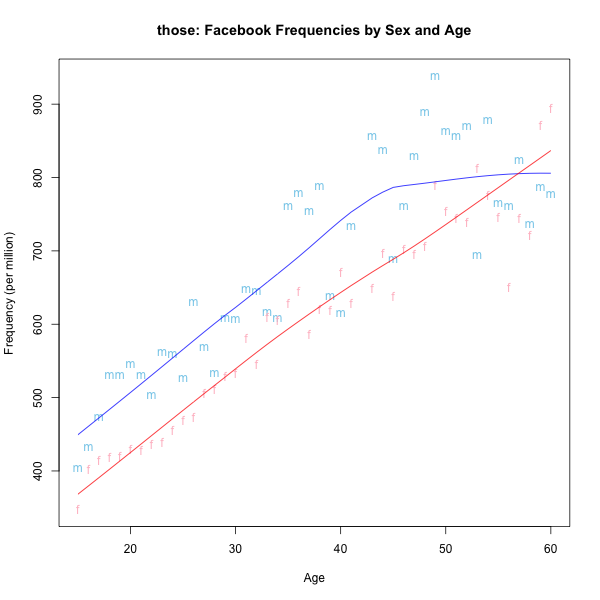
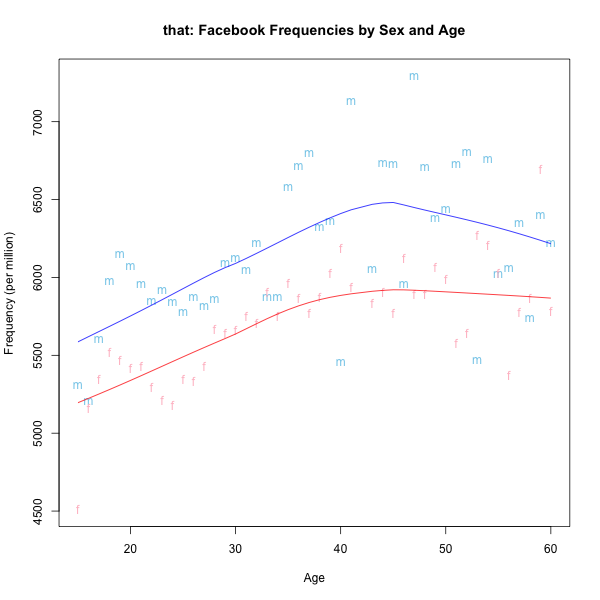
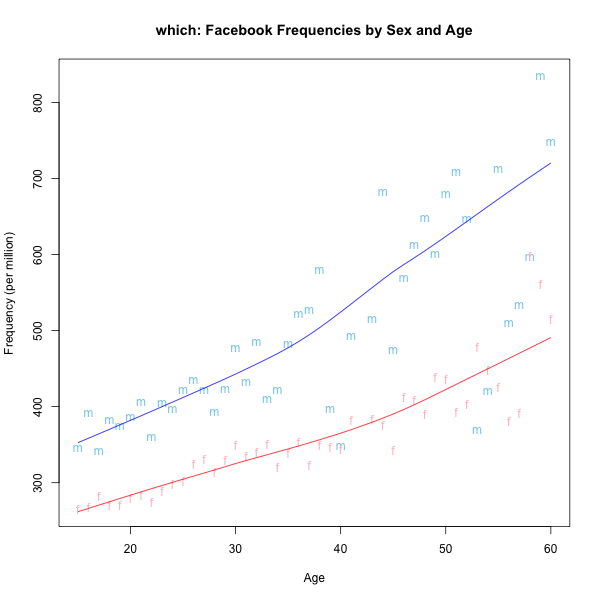
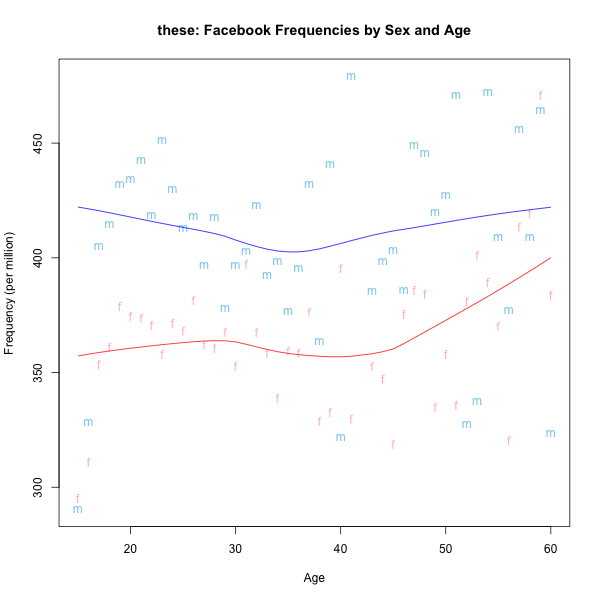
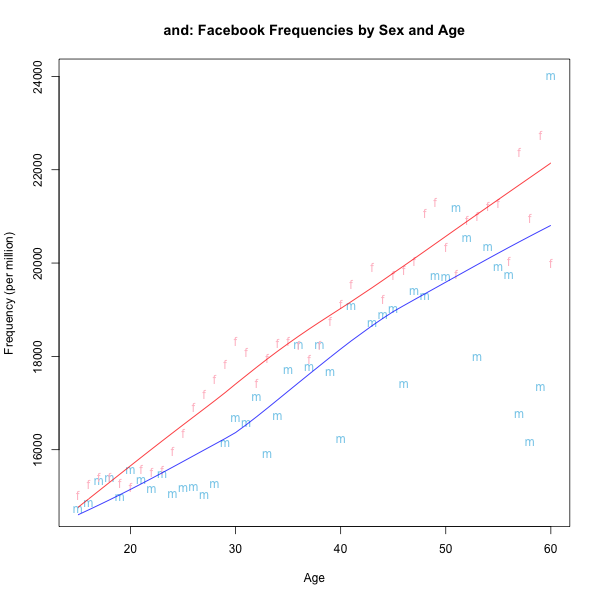
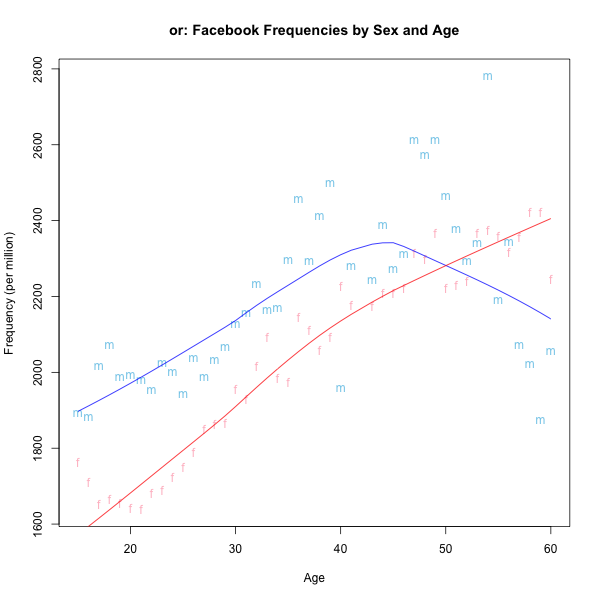
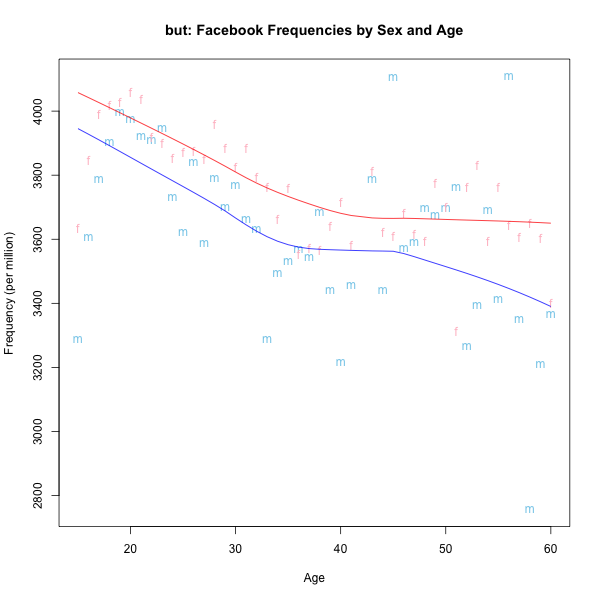
KevinR said,
October 12, 2014 @ 12:57 pm
As a 39-year-old, I have to wonder what's wrong with the 40-year-old men. They seem to be consistently low by every measure, usually by a wide margin.
(Is 40 the default or a missing data signifier?)
[(myl) 42 seems to be the default in this data, due to the fact that 40 was the default at the start of the two-year collection period:
But there might well be some other artefacts.]
Keith said,
October 12, 2014 @ 1:53 pm
How about some way to relate phrase length with age, and another to include non-standard spellings.
It seems to me that one reason for not using some of these words might be extremely short phrases like "look at dis pic of ma ktteh".
K.
David Morris said,
October 12, 2014 @ 2:35 pm
I note that the y-axis for each graph does not start at zero. I suspect that if they did, the gap between the lines would appear much smaller.
David Bird said,
October 12, 2014 @ 2:45 pm
Is that peak in the use of "that" for 18- to 22-year-olds significant? I've been wondering whether the striking recent peak I have been noticing in the use of "that" as a demonstrative adjective, on the radio and on the web, is real or illusory. Here's a new example I received today: http://www.er.uqam.ca/nobel/r30240/that_number_8.jpg.
Eric P Smith said,
October 12, 2014 @ 7:37 pm
@David Bird: This is one heck of a tangent, but I found "that number eight" at first glance, in well under 1 second, which I think is to be expected of a man with Asperger Syndrome.
Kristian said,
October 13, 2014 @ 1:07 pm
@Keith: yes, phrase length could be a factor – but your example (look at dis pic of ma ktteh) is still a syntactically well-formed non-elliptical sentence. Many posts in the data may not be, but instead consist of one or two word phrases ("awesome", "lol thanks").
It would be interesting to see the distribution of some high-frequency content words (make, know, see, think, time, come, people, good, look…). I would assume a mirror image to the "and" graph for at least some of them.
A more direct way of answering the question of phrase length would be to calculate the mean length of posting for each age/gender combination.
D.O. said,
October 13, 2014 @ 2:49 pm
@Eric P Smith. The whole idea of that picture is that lots of people will easily find "8" and "share" it.
Eric P Smith said,
October 13, 2014 @ 5:59 pm
@D.O. I see. I don't do social media. Actually, I don't do social.
Bill Benzon said,
October 14, 2014 @ 3:55 pm
@D.O. But there ARE people who have trouble finding it. A Facebook friend of mine gave up looking until some one have him a tip on what to do: don't scan in a focused way, just sort of "float" over the image.
Yuval said,
October 15, 2014 @ 3:15 am
In Yahoo Answers data we notice peaks of user ages at (currently) 24, 34, 44, etc. due to the fact that people who don't want to disclose an exact age (or are too lazy) go for the round year. The FB data seems to be devoid of this, which is nice.
Bob Ladd said,
October 16, 2014 @ 12:10 am
The fact that male posters use more the and that than female posters seems likely to be related to the fact that female posters use more third-person animate pronouns than male posters (see earlier LL posts). That is, it suggests a generalisation about different types of referring expressions: men use more lexical noun phrases as referring expressions, and women use more pronouns.
Some of this might be accounted for by more occurrences of things like that asshole in men's postings, but I doubt that's the whole story. Maybe women write more as if to an intimate group where pronouns will successfully refer, whereas men write more as if to a broader public where a more complete referring expression is necessary? Whatever is going on, it's going on throughout the life span.